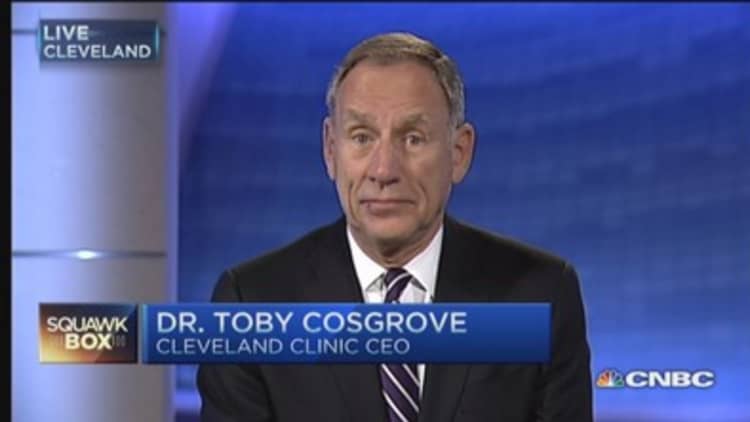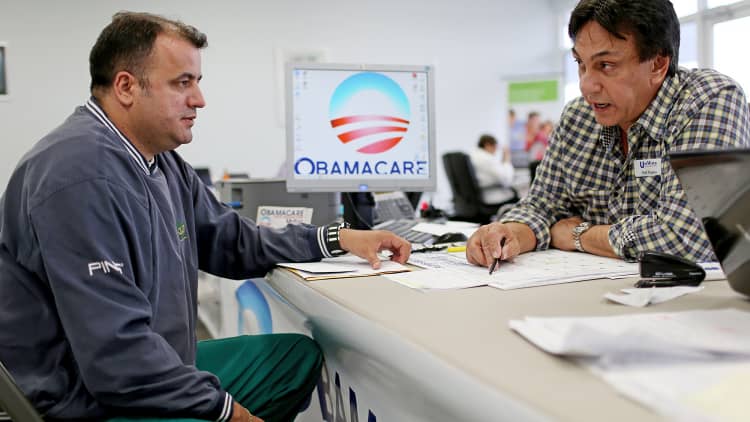
For millions of people this tax season, Obamacare won't be quite a "50-50" proposition, but it will sure come close.
Half of the households that received federal subsidies to help pay for their health insurance in 2014 will have to repay some money back to the government when they file their tax returns, a new analysis released Tuesday estimates.
The average repayment owed by those people will be $794, the Kaiser Family Foundation study found. The repayments will be owed because those households' actual incomes ended up being higher for the year than what they had estimated when they applied for the subsidies.
Read MoreUninsured opt for Obamacare fine?
Another 45 percent of households that received such subsidies will be owed a refund, because they should have received more of those tax credits last year based on their final annual incomes. Their estimated average refund will be $773, Kaiser said.

But the Kaiser study also found that a relatively small group of households will owe back a lot more than the average when it comes to refunds, after their actual incomes ended up being too high to qualify for the subsidies they got.
That group of people will have an average repayment of between $2,306 and $3,837—and some could owe much more. Unlike people who earn below 400 percent of the federal poverty line, higher earners have no limit on the subsidies they must pay back if they were not entitled to them.
And for low-income subsidy recipients who end up owing money back, the tax bite could strain their already-tight budgets.The average repayment that group of people will have to pay back will be $667, according to the study.
Those who earn less than two times the poverty level are also more likely than other income groups to owe a repayment.
"None of these amounts are insignificant," said Gary Claxton, co-author of the Kaiser analysis, referring to the average amounts all income groups will owe if they face repayments.
Read MoreIRS gives some Obamacare customers a tax break
Those average repayments range from $667 for the lowest income group to a high of $1,380 for people just under the 400 percent of poverty level. And the refunds range on average from a low of $412 to a high of $1,601, within the income bands.
And those amounts will come as a surprise to many Obamacare customers, who may not have understood that their subsidies have to be reconciled with their taxes, and as a result will offset the amount of tax refunds they were expecting, or lead to them actually cutting a check to the Internal Revenue Service.
"Some people are not going to know this was coming," Claxton said.
According to a poll Kaiser released last week, 4 out of 10 Americans did not know it was possible that a person who received financial help to pay for their Obamacare plans could end up owing money back to the government.
The new analysis comes less than a month before the April 15 deadlinefor filing income tax returns with the IRS, and after the first year of Obamacare private insurance enrollment.
The study only considered the effects of changes in a household's income. It did not consider changes in household size, which also could affect how much a family will have to repay in subsidies or receive as a refund.
Under the health reform law, people who earn between 100-to-400 percent of the federal poverty level—or $11,490 to $45,960 for an individual—qualify for tax credits to help pay their monthly insurance premiums if they buy health plans sold on a government-run Obamacare exchange, such as HealthCare.gov.
Nearly 9 of every 10 Obamacare exchange customers qualified for a subsidy. The Kaiser study notes that the Treasury Department has estimated that between 4.5 million and 7.5 million households received such subsidies during last year.
Those subsidies, or tax credits, are closely linked to a person's income. As a rule, the lower a person's income, the more they receive in tax credits to help pay their monthly premiums.
Read MoreObamacare rule: I need to declare what on my taxes?
But those monthly subsidy amounts were issued by the government when a person enrolled in insurance and were based on the customer's estimate of how much they would earn during the year. However, "people's incomes tend to change, at least a little bit," during the course of a year, Claxton said.
Because of that, Obamacare subsidy recipients are supposed to report changes in income, along with changes in household size, to the exchange where they purchased their health plan. That's so their subsidies can be adjusted during the year, to minimize the amount a person has to repay when they file their taxes.
But it's not clear how many people actually adjusted their stated incomes during the course of last year—or how many even knew they were supposed to do that.
"In the first year, many people did not even realize they were receiving subsidies," the Kaiser study noted.
Claxton said, "I think over time, people who use this program will come to realize the importance of making the adjustments through the year."
"Maybe more information is needed so people know when they signup what the expectation is, and that it really is important that they stay on top of any changes," Claxton said.



